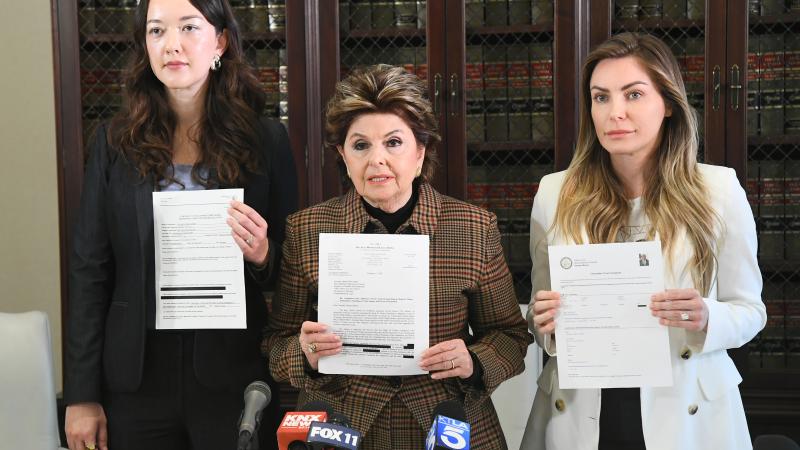Congress to leverage 'power of the purse,' taking aim at Big Education amid ugly campus riots
A growing number of lawmakers urge cutting federal funds to universities, eliminating tenure and revoking tax-exemptions for groups that fund hatred.
The debate in Congress over federal funding of education dates to the days of Thomas Jefferson, but for the first time since Jimmy Carter created the U.S. Education Department a large number of lawmakers are now openly discussing cutting funding and changing the tax code to punish universities that have failed to quell anti-Israel riots and force a shift from the far-left ideologies that have taken root on most campuses.
“I think that the American people are pretty outraged about this, and they expect the Republicans in Congress to respond in kind with the power of the purse,” House Oversight Committee Chairman James Comer told the "Just the News, No Noise" television show last week after visiting the protest-wracked George Washington University campus.
In interviews with numerous members of Congress last week, Just the News identified more than a dozen proposals being considered to punish universities and groups that have fomented anti-Israel protests and riots and to force a recalibration in curriculum after decades of far-leftward drift.
They range from changes to the tax code, cutting billions in research grants to universities, forcing an end to tenure protections for professors and teachers and eliminating tax-exempt status for nonprofits that fund anti-Israel, anti-American agendas or taxpayer funding for organizations like NPR that are accused of driving a leftist agenda.
Rep. Claudia Tenney, R-N.Y., a member of the powerful tax-writing House Ways and Means Committee, said she is drafting legislation to eliminate tax-exemptions for organizations that organize violence, inject politics into education or seek to disrupt the education of Jewish students.
“There are organizations that get dark money and they use our IRS structure, whether it's a 501c3 or 501c4 or other parts of the IRS Code, to get around taxes and then use this for political purposes,” Tenney told the "Just the News, No Noise" television show. “And we need to crack down on that."
“These people should not be abusing our tax system in order to get money for political purposes into these issues,” she added.
Tenney also proposed a three-point plan for universities that have promoted or failed to quell violence or protect the education of Jewish students, including revoking tax-exemptions for the schools themselves.
“Expel these students, deport the students who are foreign students who are acting in this way and get rid of the professors’ (tenure) and again, go back to removing the tax exemption, taking away their ability to accumulate these funds and these fees through these not-for-profit groups and student organizations, like Students for Justice in Palestine,” she said.
House Judiciary Committee Chairman Jim Jordan last week escalated pressure on the Homeland Security Secretary Alejandro Mayorkas and Secretary of State Antony Blinken to deport foreigners on student visas who have been captured on video chanting “death to America,” “I am Hamas” or threatening Jewish students.
“My work is asking those sort of three fundamental questions: How many of the students are here on a visa who are engaged in this radical activity? Have you moved to revoke their visa? And have you started removal proceedings?” he explained. “Because that's what's supposed to happen, particularly when it's terrorist activity, and these individuals are talking about, you know, destruction for our dearest and closest ally, the State of Israel.”
Rep. Josh Brecheen, R-Okla., wants to take the debate further, challenging the constitutionality of the U.S. Education Department and federal education spending. He noted that Thomas Jefferson once believed the federal government should pass an amendment to enshrine funding public or college education in the Constitution.
“I want to start with that and say you can’t make a constitutional case for it,” Brecheen said of federal education spending. “So at a minimum, even my colleagues who won't go so far as what Reagan did in saying we need to get rid of the Department of Education, well, at least we can agree that if you're threatening the lives of students on campus, federal dollars ought to be immediately shut off.”
Comer, the powerful Oversight chairman, agreed there is a growing appetite to cut federal dollars to elite universities with huge multibillion dollar endowments. Those dollars include lucrative research grants. Columbia University, the epicenter of the sometimes violent protests has an endowment of $13.64 billion, according to the school. Harvard, also a hotbed of antisemitic and anti-American protests, has the largest endowment of and school in the U.S, totalling more than $49 billion, according to the National Association of College and University Business Officers.
“This is something that appears there's overwhelming support for,” Comer said. “These universities get a lot of money. Where most of these protests are occurring across the United States are big universities that have huge federal budgets in their research and development budgets and other areas of their overall budget on campus.”
Rep. Scott Perry, R-Pa., wants to take the federal spending cuts further to National Public Radio, arguing its content is biased and fuels the leftward movement of ideology in the country and on campuses.
“If they want to be out propagandizing and promoting leftist ideology, this is America, they can do it,” Perry said. “They just should not receive one red cent from hard earned tax dollars. And that's what we're saying; they can go raise the money from their contributors or George Soros or whoever they want. But it shouldn't be forced on the taxpayers to pay for this stuff.”
Lawmakers said the next step in implementing these ideas is for Ways and Means to propose changes to the tax code while House appropriators begin architecting cuts to funding in the 2025 budgets.
Rep. Marjorie Taylor Greene, R-Ga., who is pushing a vote to oust Speaker Mike Johnson this week on grounds he failed to cut spending or secure the border like the GOP promised, is vowing to apply maximum pressure on fellow lawmakers to do something impactful in the next budget.
“It's the common sense solution. We're $34 trillion in debt, so the easiest way to deal with these colleges and universities is to defund them,” she told the John Solomon Reports podcast. “And that saves the American taxpayer some money, and it cuts down on our government spending, which also helps inflation. I mean, this is a win-win for everyone.”
While Congress ramps up its efforts, states are also using their own power of the purse to force changes in behavior. Florida and Oklahoma are just two of the states to take action in recent days.
Ryan Walters, Oklahoma superintendent of public education, said the next big battle is ending tenure for college professors and unreasonable protections for failing teachers at the K-12 level.
“I want to incentivize the best people to teach. And frankly, if you're not doing a good job, I don't want you to teach because I believe that that profession makes a difference,” he told podcast host Amanda Head last week. “So I want to build a system that incentivizes the best and brightest to be in. And if you're not, let's find another job for you. But let's not have kids have a negative impact on their experience, because we don't have high performers in the classroom.”














